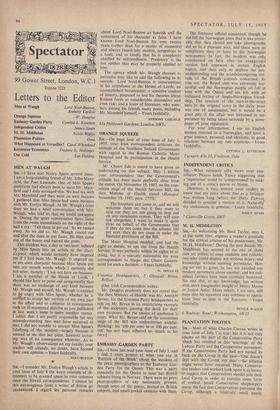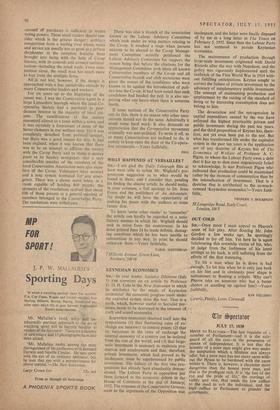PLANTATION POLITICS SIR,—Most of what Charles Curran writes in your
issue of July 1 is true; but it is not only apathy on the part of the Conservative Party which has resulted in this 'marriage' of the Labour Party and the Co-operative movement. If the Conservative Party had not turned its back on the Co-op in the past—'One doesn't deal with the Co-op, my dear'—the alliance might never have occurred. Many Conserva- tive leaders and workers look upon it as heresy to suggest that Conservatives should join their local Co-op in order to exercise some form of control. Small Conservative shopkeepers resent the fact that Conservatives patronise the Co-op, although a relatively small yearly amount of purchases is sufficient to secure voting powers. These small traders should con- sider which is the greater danger: ordinary competition from a trading rival whose wares and service are usually not as good as a private shopkeeper or the complete Socialist State brought into being with the help of Co-op finance, with its controls and avowed national- isation—including the retail trade. From com- petition alone, the small man has much more to fear from the multiple firms.
All'„is not lost, however, if the danger is approached with a less ostrich-like attitude by many Conservative leaders and workers.
For six years up to the beginning of the recent war, I was the Conservative agent in a large Lancashire borough where the local Co- operative Society had a pre-natal to post- decease interest in the majority of local citi- zens. The ramifications of this society amounted almost to a town within a town, and it was certainly a forerunner of some of the better elements in our welfare state. Yet it was completely detached from political control; but there was a good reason for this. It .had been realised, when it was known that there was to be an attempt to affiliate the society with the Co-op Party and to make a money grant to its Sunday newspaper, that a very considerable number of the members of the local Conservative Association were also mem- bers of the Co-op. Volunteers were secured and a rota system instituted for any emer- gency. There was a classic scene when, in a room capable of holding 800 people, the sponsors of the resolutions realised that about 600 of those present at a general meeting of members belonged to the Conservative Party. The resolutions were withdrawn.
There was also a branch of the association known as the Labour Advisory Committee which took under its wing matters relating to the Co-op. It reached a stage when persons anxious to be elected to the Co-op Manage- ment Committee actually petitioned the Labour Advisory Committee for support, the reason being that before the elections for; the Management Committee took place all known Conservative members of the Co-op and all Conservative branch and club secretaries were given the names of the candidates who were known to be against the introduction of poli- tics into the Co-op. It had been noted that such candidates had headed the poll. It is also sur- prising what one hears when there is someone inside.
If some sections of the Conservative Party can do this, there is no reason why other asso- ciations should not do the same. Admittedly it needs some hard work. It also demands an appreciation that the Co-operative movement originally was non-political. To write it off, as so many Conservatives are inclined to do, is merely to keep open the door of the Co-opera- tive cornucopia.—Yours faithfully,
OMA



































 Previous page
Previous page